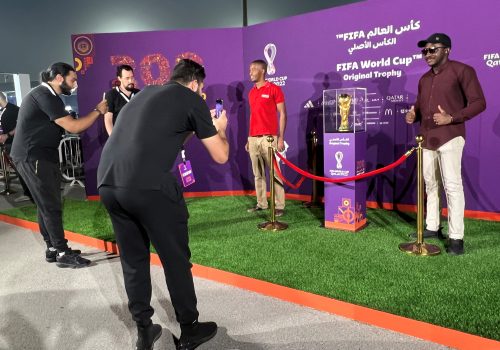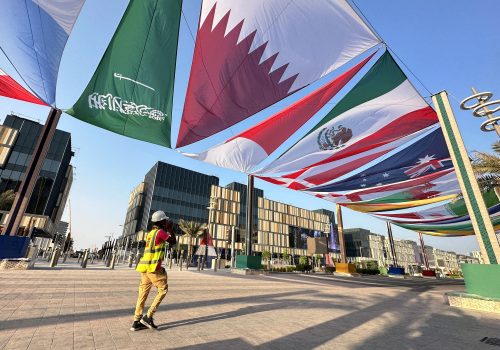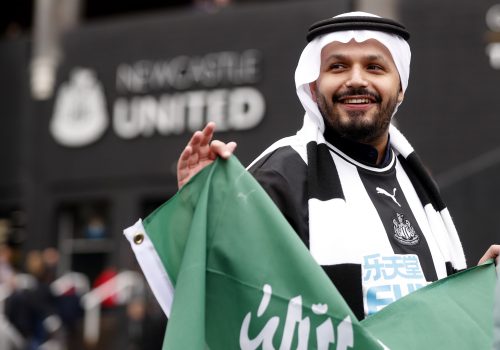Morocco’s World Cup victories are historical revenge for subaltern dreamers from the global south
“Look who we are, we are the dreamers. We make it happen, ‘cause we believe it,” sings South Korean boy band BTS’s Jung Kook in his official song for the 2022 FIFA World Cup with Qatari singer Fahad Al Kubaisi.
The single created by multi-Grammy award-winning Moroccan-Swedish producer RedOne embodies the spirit with which the Moroccan team—against all odds—kept knocking out top contenders like Portugal, Spain, and Belgium and advancing through the competition. Thus far, the defeat-free journey of the Moroccan soccer national team, the Atlas Lions, is more than a simple sports score. It is an upheaval in soccer culture—a symbolic capital for Africans, Arabs, and Muslims everywhere and a historical revenge of subaltern dreamers from the global south.
A change in the culture of soccer
Modern soccer was codified in nineteenth-century Britain and soon became a European favorite. The collective sport turned into a global sensation with the creation of the International Federation of Association Football (FIFA) and organization of the first World Cup in 1930 in Uruguay. Soccer remains a largely euro-centric sport today, supported by professional leagues, media, and capitals in the old continent with outliers in the Americas. Thus, soccer culture is linked to iconic players who built their careers in Spanish, British, Italian, and other European teams. It is also largely associated with ritualistic beer drinking, ultras chanting, and shots of beautiful white models featured on television screens.
The 2022 FIFA World Cup in Qatar—aside from its questionable human rights records and bribery allegations—has reconfigured the rites of the event and dictated new norms in synchronicity with its Arab and Islamic values despite western uproar and disapproval. Morocco, the North African dark horse-turned-favorite of the competition, also had a few lessons to convey.
Images of players prostrating to pray after each match, the celebration of family solidarity with players embracing their parents, and the waving of the Palestinian flag for every memorial picture are all acts of defiance of an essentially western-centric football culture and signals a more diverse and inclusive set of symbols that are epistemologically different from the usual World Cup glam. Likewise, the team’s fans have elected a new motto inspired by the religious teaching of the Arabic hashtag “trusting in God” (#ديروا_النية), which has been widely used on social media even by the newly appointed US ambassador to Morocco, Ambassador Puneet Talwar.
Shattering colonial complexes
The Moroccan team’s victories are hailed extensively by other global south countries, notably those who see the team’s resilience and combativity as a reflection of their own battle. Supporters across the African continent and the Arab and Muslim worlds spontaneously allied behind the Atlas Lions in defiance of their old Spanish, Portuguese, Belgian, French, and British colonizers. Metaphorically, each victory shattered old imperialist complexes that European coaches and teams are inherently superior. For Arab countries particularly, a new pan-Arab sentiment rose and erased decades of defeatist mentality.
For the host country, Morocco’s wins are, by extension, the continuation and channeling of the Qatari dreams in the competition—an avenue for all Arabs to keep dreaming. Qatari Emir Tamim bin Hamad Al Thani made sure to showcase his favorite team loud and clear by waving Morocco’s red flag with a green star during its December 10 match with Portugal. As a result of the Atlas Lions’ rise to the semi-final against France on December 14, millions of Arab youth and children are redefining their soccer idols after the surreal sight of Portugal’s Cristiano Ronaldo leaving the pitch crying and finding new heroes in more self-identifiable players like Hakim Ziyech, Achraf Hakimi, and Yassine Bounou. In other words, representation matters.
The tale of Moroccan players is also that of first- and second-generation migrants who had mixed experiences of integration in Europe, where many were born and raised. It points to a larger story of how Europe may have provided the investment that these athletes didn’t find “back home,” but ultimately failed to build a genuine connection to their countries of birth that have often been the source of discrimination and mistreatment to their North African immigrant communities. In the end, fourteen out of twenty-six players chose to represent the red and green colors of their forefathers for the World Cup.
As the world order starts shifting anew towards multipolarity, the Qatar World Cup and the consecutive symbolic triumphs of the Moroccan team can be seen as an illustration of shifting powers and hybrid world narratives. The shifts in the poles of power and crumbling of western hegemony that mostly one-sided western media might have obscured found an auspicious opportunity to unfold before the eyes of world viewers avidly following the competition and pondering the uneasy question: When did the world change so much?
Sarah Zaaimi is the deputy director for communications at Rafik Hariri Center and Middle East Programs. Follow her on Twitter @ZaaimiSarah.
Further reading
Fri, May 6, 2022
Can soccer plead ignorance? A World Cup of politics is brewing for Qatar 2022.
MENASource By Joze Pelayo, Hamad Abbas
The integration of politics with the World Cup goes beyond the Russian invasion, as the choice of Qatar as the host nation invited significant backlash.
Tue, Oct 25, 2022
The 2022 FIFA World Cup is less than a month away. Qatar’s supposed labor reforms have done little to improve worker’s conditions.
MENASource By
The workers responsible for making this event happen continue to face death and abuse each day, while risking deportation if they protest.
Mon, Apr 4, 2022
Many European soccer teams are owned by Gulf states. But why?
MENASource By Hezha Barzani
With a lucrative and rapidly growing European soccer market, it’s safe to say that Gulf nations will continue to invest in the beautiful game and reap benefits economically and socially.
Image: Al Thumama Stadium The Moroccan team celebrates after winning 1-0 in the match between Morocco and Portugal, valid for the quarterfinals of the World Cup, held at Al Thumama Stadium in Doha, Qatar. (Marcio Machado/SPP) (Photo by Marcio Machado/SPP/Sipa USA)


